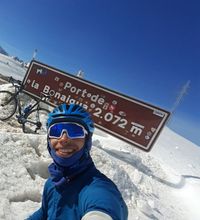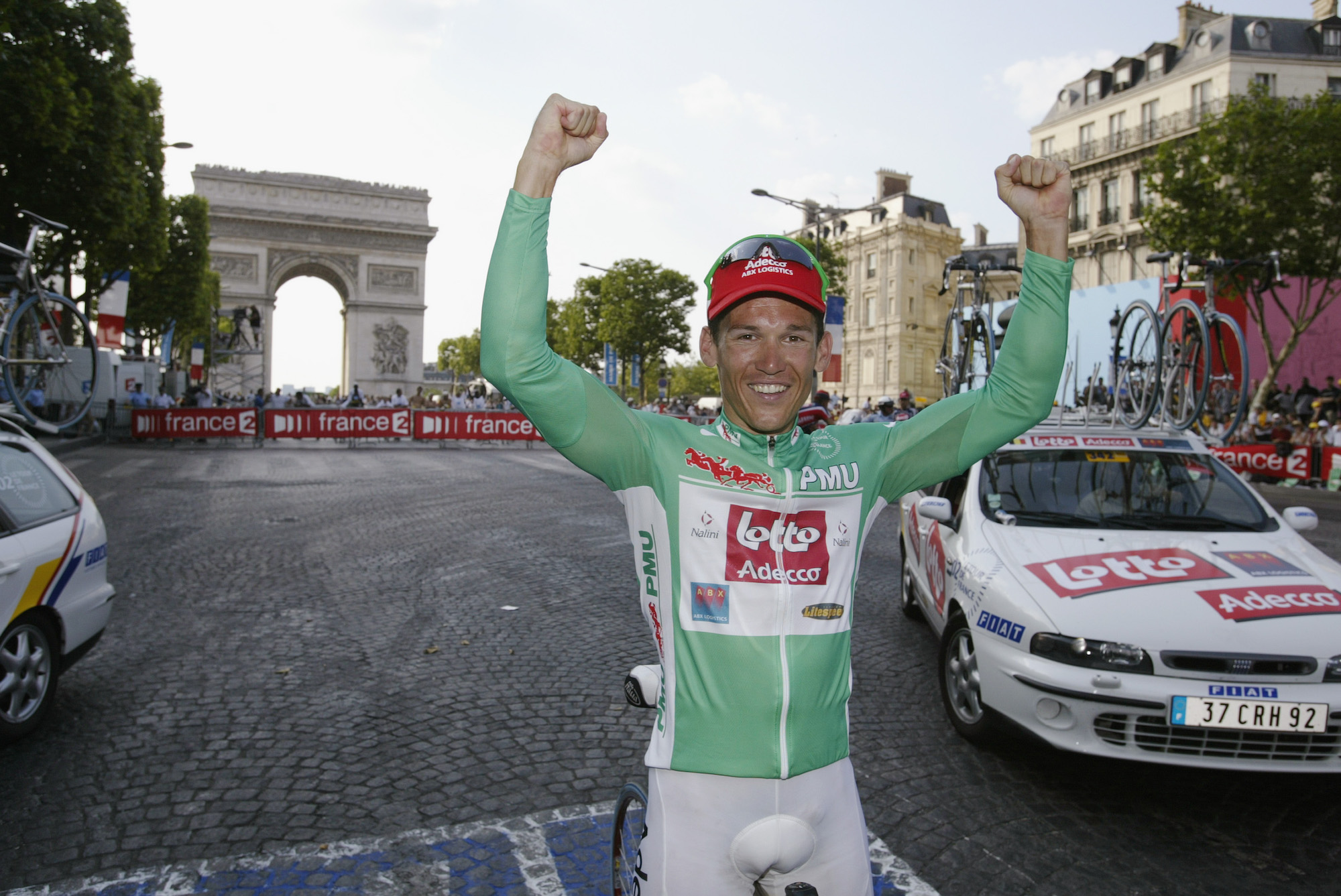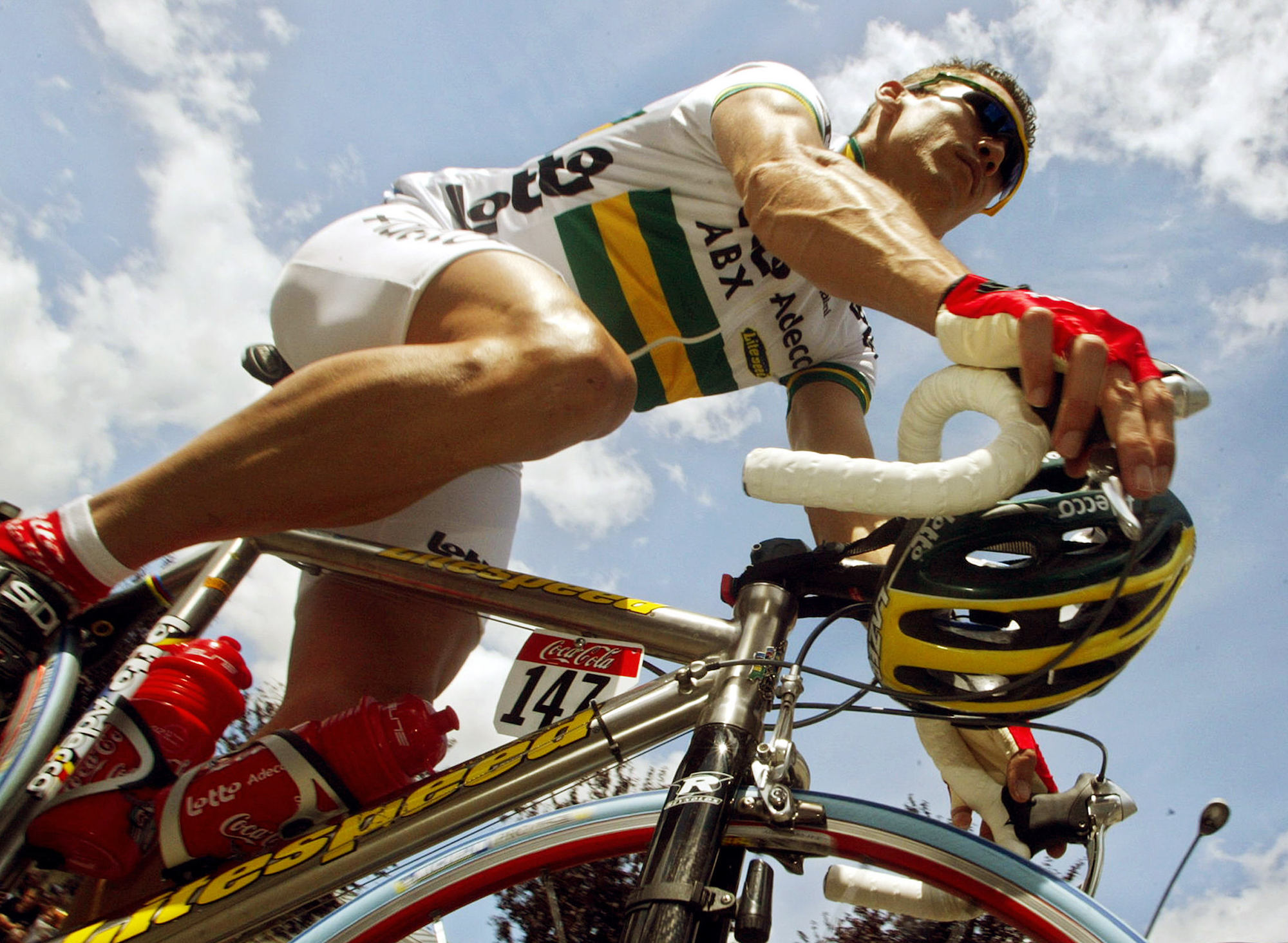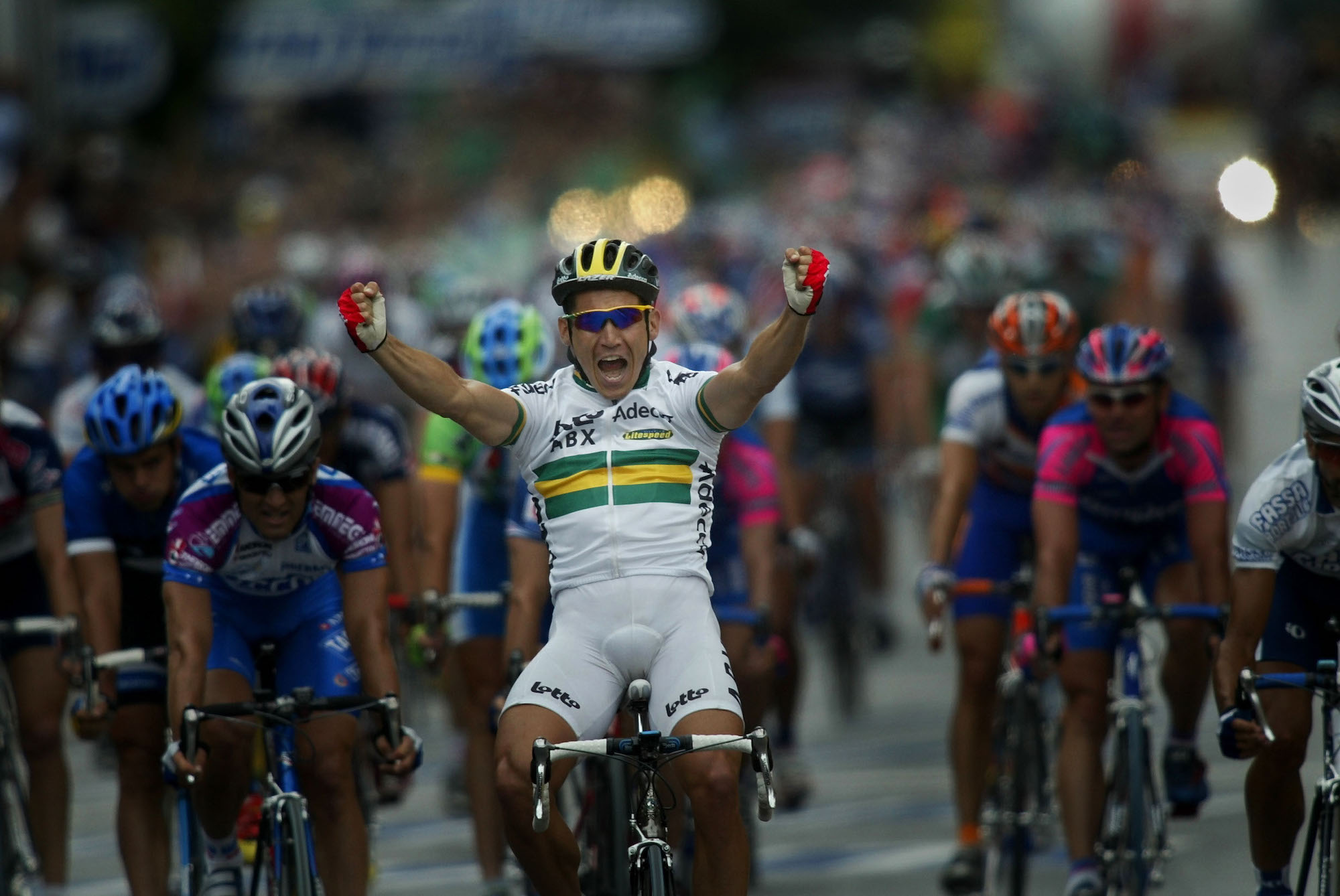The beast uncaged: Robbie McEwen's best year
In 2002 the star sprint Robbie McEwan wasted no time making a mark at his new team and, writes Chris Marshall-Bell, that was just the beginning


(Photo by Mike Powell/Getty Images)
The latest race content, interviews, features, reviews and expert buying guides, direct to your inbox!
You are now subscribed
Your newsletter sign-up was successful
It was six in the morning when Christophe Sercu’s phone rang. “Walter?” the Lotto-Adecco manager wearily queried from his bed in Belgium to his director sportif Walter Planckaert. “Morning. Robbie won today.”
The same phone call repeated itself two days later. And the day after. Oh, and two days after that. Robbie McEwen’s first week riding with his new team had yielded a quartet of victories at the 2002 Tour Down Under in just six stages. “Walter rang me every morning from Australia saying that he won again,” Sercu says. “Every time it was so very early. So early. But he was having an impact already.”
Indeed. Before McEwen raced in the red of the Belgian team with his new teammates, he had already won four times: twice at the Geelong Bay Crits and in becoming Australian national road and criterium champion. “I hadn’t lost in the Lotto jersey before I raced with my new team. I was in red hot form. I felt so incredible,” he recalls.
Remarkably, just a few weeks prior to his domination in his home country, McEwen was preparing to spend Christmas unemployed, the lowest nadir of a “terrible” first two years of the new century. Despite winning a few times in 2000 riding for Farm Frites, the season “was a blowout – a disaster for everyone. Badly managed.” 2001 with Domo-Farm Frites he was “treated like a second-class citizen” and his management couldn’t find him a team for the 2002 season. “I felt like I had been blackballed,” he tells Cycling Weekly.
>>> Subscriptions deals for Cycling Weekly magazine
Lotto-Adecco were his only option but the Belgian team didn’t have the financial muscle of their rivals and could only offer him a basic wage with win bonuses. “I tried really hard to convince him that we’d give him the support he needed, that we’d build a team around him,” Sercu remembers. “Christophe said he would see if it was possible to scrape something together,” McEwen recounts. “On Christmas Eve he rang me to say it was on. It was a bare bones contract. I had to hit big wins to get the bonuses, but I was grateful for the ride.”
Rated today as one of the finest sprinters of the 21st century, at the turn of the new millennium he was regarded as a rider supposedly at his peak who had failed to live up to lofty expectations. He was, at best, a B-class sprinter. A modern-day Nacer Bouhanni, if you like, minus the punches and aggression. “I was hellbent on redeeming myself, proving to myself and others what sort of rider I was.”
The latest race content, interviews, features, reviews and expert buying guides, direct to your inbox!
He certainly achieved that. 2002 brought a total of 19 professional wins including four in Grand Tours, a maiden green jersey in the Tour de France, and a silver medal in the World Championships.
Australia was the precursor to victories, to the formation of team chemistry, of friendships, and of memories. “As a team, we banded together, gelled so quickly. We had an amazing feeling instantly,” McEwen smiles. “Every day we won Down Under we went into Adelaide to drink champagne to celebrate. It wasn’t about the drinking but it was about the bonding. We ate, drank, spent time together and walked around. It was a relaxed laugh. We were more like a gang than a team. It was a lot of fun from the get go. We were all in sync and it was like being in a group of best mates that we never knew we had.”

Upon flying to Europe at the end of January, McEwen was euphoric. “I thought I could take on anyone. It wasn’t just the wins I’d had but I felt like I had found a home.” He topped the general classification at the Etoile de Bessèges, thanks to a stage win, three seconds and a third.
He then claimed victory on stage two at Paris-Nice, the first time he’d beaten one of Alessandro Petacchi, Mario Cipollini and Erick Zabel. “It was a rising finish in Belleville and I thought, ‘this has got me written all over it.’ I felt like I won quite easily that day. It was the first big stage race win of the year I thought, ‘Ok, here we go now. The rest has been good, but now things get serious.’” On stage seven in Nice, “I found Petacchi’s wheel, surfed my way through and beat them all.” The trio of fast men begrudgingly welcomed a fourth member to their house of perennial winners.
McEwen had arrived. At Scheldeprijs - the sprinter’s classic - he was “really confident.” It showed. “I sprinted like the 11 other races I’d won. It felt so easy, honestly.” Download the race and click X to win: sprinting was becoming as simple as pressing turbo-boost on a gamepad. “I just chalked up another one. ‘Rightio, then, number 12’. The counter just kept ticking over.”
He had earned the trust of his teammates. The most important one was his lead-out man Aart Vierhouten he remembers: “He beat the best sprinters in the world at Scheldeprijs. From then the team was convinced of him.” So persuaded were the team that they gave McEwen complete control of his schedule. He decided what races he would do, when he would peak, when he would train, and when he would rest. “There was a perfect ebb and flow to the season: race to win, and then take a break. I had four peaks that season and then recovered.”
His second peak was the Giro d’Italia. “I had been dominating the sprints until then but this was the Giro v Cipo. I was super motivated.” He was third on stage one, barged into the side by his Italian rival. “I knew Cipo had got me, but I told him it wasn’t the last he’d see of me.” Another chance of victory on stage three was scuppered by a pedal tangling with his spokes. “I was burning inside. I wanted a proper head-to-head sprint with Cipo. On stage four I made it clear to everybody that the only person getting on Cipo’s wheel in the last kilometre was me.”
His plea was met. “With 100m to go, I drove for the line and Cipo had never looked so surprised. It was a perfect lead out for him, over 70mk/h, and he’d got beaten. It wasn’t a told you so moment, but I was really excited. I was even a bit excited that I was able to go past him at that speed.” His reputation rose further. “Finally, I had snagged a really serious win in front of a guy considered the fastest sprinter in the world. I had gotten my Grand Tour career on track.”
Cipollini and his Acqua & Sapone team were furious, though. On the transfer to Italy, Cipollini took exception to the defeat. Vierhouten recalls: “Cipo stood up on the bus, shouted at me in Italian, and I replied in Dutch, making fun of him and making him more upset. Robbie said, ‘Aert, maybe better to shut up and sit next to me.’ I agreed, but on the plane Cipo started the argument again. He was complaining that the sprint wasn’t fair and I said: ‘Have you forgotten about the first sprint when you bombarded Robbie into the barrier?’ Someone translated it to him and he shut up. Our tactics and plans were working.” McEwen won again on stage 10 before doing what many sprinters do at the Giro and signing off from the race. He’d made his point by then, stealing the space and headlines normally reserved for Cipollini.
The transformation, he says, owed itself to “a perfect storm.” He explains: “I stepped up as a rider and the little things that can derail you didn’t happen. I didn’t get sick the whole season, for example.” More than personal luck though was timing: his age, 29 going on 30 – “I had matured as an athlete” – and the evolution in the fight against doping. “2001 was the first time there was a proper test for EPO. It was no coincidence that the next season it was definitely easier to win races. Races became slower. There was a smaller pool of cheats and that was one of the best things for me. I’m not saying I didn’t win stuff because people were cheating, but it just got easier. It was a contributing factor.”
His team were unwaveringly committed too - for McEwen, for themselves and for monetary reasons. “We had a big bonus system,” Vierhouten says. “Robbie didn’t like taking the money, so in a Grand Tour stage we’d share between €10,000 and €20,000 between eight of us. That made the team stronger; easier to suffer and to go through pain; easier to go close gaps knowing the sprinter was there. It made us one of the strongest teams.”
Even the image that McEwen had to uphold as a sprinter didn’t deter them. “Sprinters are special: they are eager, selfish, they show off, they have nice sunglasses,” Vierhouten laughs. “You have to accept that those little things made Robbie McEwen who he was. And I loved him the way he was.”

Every successful story is on the right side of a sliding doors moment where fate pans out when it could so easily have gone the other way. McEwen had such a moment in late June, one week before the Tour de France, when his wife, Angelique, was motor-pacing him along the River Scheldt in Belgium on her new Vespa. “It was a 20km flat, open section that was really safe, especially for the time of day we were out,” McEwen regales.
“I was going 55kmh, so pretty quick, and the next thing I know she’d tapped the brakes on the Vespa and I was forced to wrestle the handlebars like a bull rider trying to save it. Thankfully I did, and I asked her, very calmly and politely, ‘what the f**k are you doing?’ ‘A rabbit ran out across the path!’ she said. A rabbit! She asked what she was supposed to do I said, ‘Run it over!’ I had seen the rest of my season flash before my eyes. I said, ‘Honey, it’s a rabbit. It will fly into a million pieces. It wouldn’t have hurt us.’”
Injury averted and a rabbit saved from a grisly fate, McEwen headed to the Tour de France – not having won a stage there since his first in 1999. “People were talking about me as a favourite for stages and it was fuel on the fire,” he says. The first stage he was third, the following second, and then finally on stage three he triumphed. “Three, two, one – that was more like it,” he reflects. “My goal of the entire season was to win another stage of the Tour. Everything was going perfectly so I had to.”
Consistent high placings locked McEwen in a battle for the maillot verde with Erik Zabel – a welcome accident. “I didn’t see myself as a major contender for green,” he says. Zabel had won the previous six – a record only since surpassed by Peter Sagan. “But it just happened. The first half of the Tour became a battle with Zabel. He got me interested in it because he was racing against me, treating me as a direct threat. And I thought, ‘well, yeah, I am actually’. Then I raced for it.”
Except for one stage in between, Zabel wore green from stage one to stage 13, and then McEwen nudged in front. “I said to the team I wanted to go for the first intermediate sprint only. With the yellow, you can relax most of the day but with green it’s the exact opposite as there are so many vital moments.” The tension was palpable. Vierhouten went home with an illness but remained McEwen’s closest tactical and personal ally. “I was really analysing it from home and one night I called Robbie and said: ‘That f****r Zabel is really aiming for it.’ I was sort of like his coach from outside.” The team that remained “were looking after me like I was their child,” McEwen remembers.
The duo remained locked on the same number of points in the final week. “We were shadowing each other. There was a lot of stress. It probably cost me a stage or two because I became cagey and didn’t want to make mistakes and lose a bunch of points.” On stage 18, McEwen moved onto 239, to Zabel’s 238. And then in Paris, wearing green, he won on the Champs-Élysées securing the jersey. “It’s the biggest milestone of my career. Ask any sprinter, wearing green in Paris is what they most want to do. But the overwhelming emotion was one of relief that it was over. I was empty.”
>>> Cycling Weekly is available on your Smart phone, tablet and desktop
It was an especially poignant victory for Sercu. “My dad, Patrick, had won green and he was in Paris to see Robbie win it so it was extra special for me. Winning in Paris and taking the green jersey is the biggest of achievements. We’d hoped that Robbie would be good, and I can’t say I was surprised by his performances, but it was more than we expected.” McEwen shares the sentiment. “I was pinching myself,” he says. “I didn’t think it would be so successful. ‘Wow, this really couldn’t get any better.’”
After taking a self-prescribed break in August, McEwen returned in September with a renewed appetite. He won five times in seven days, including the GC at the Circuit Franco-Belge and a first Paris-Bruxelles – an iconic race he would eventually win five times. “It became my race; the race I should win,” he says.
His form was unquestionable ahead of the World Championships in Zolder, where he, Cipollini and Zabel shared the favourite tag. McEwen and Zabel, however, defeated themselves. “Our Tour battle resumed and our race was over when we found ourselves fighting each other for Cipo’s wheel. We were pushing and shoving, and we used a heap of energy against each other. I tried to do something, but I had ridden my race against Erik.” McEwen had to settle for a silver medal. “I’m proud of it, but the Worlds is the only thing missing from my palmarès.”
Maybe so, but his career record of 119 triumphs makes him as the 20th most winningest rider in the sport’s history to this day. 2002 was a year that brought a win, on average, every 4.5 race days. “It’s my best year. I had so many firsts: my first win at the Giro, first time winning ahead of Cipo, my first green jersey, my first stage at the Tour as a sprinter – but also the first time I was competitive in so many races. It was a breakout season that gave me so much confidence. When you’re in that form, you get into a mindset where winning feels so obvious. ‘Well, of course I won.’ I felt so confident, everything was going as I wanted. I felt ahead of the game.” He’d remain ahead of the game for the next five years.
This feature originally appeared in the print edition of Cycling Weekly, on sale in newsagents and supermarkets, priced £3.25.
A freelance sports journalist and podcaster, you'll mostly find Chris's byline attached to news scoops, profile interviews and long reads across a variety of different publications. He has been writing regularly for Cycling Weekly since 2013. In 2024 he released a seven-part podcast documentary, Ghost in the Machine, about motor doping in cycling.
Previously a ski, hiking and cycling guide in the Canadian Rockies and Spanish Pyrenees, he almost certainly holds the record for the most number of interviews conducted from snowy mountains. He lives in Valencia, Spain.
